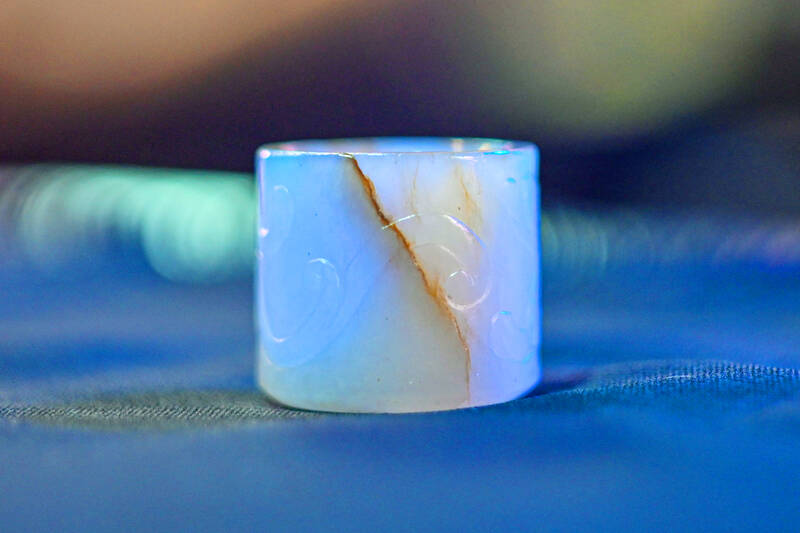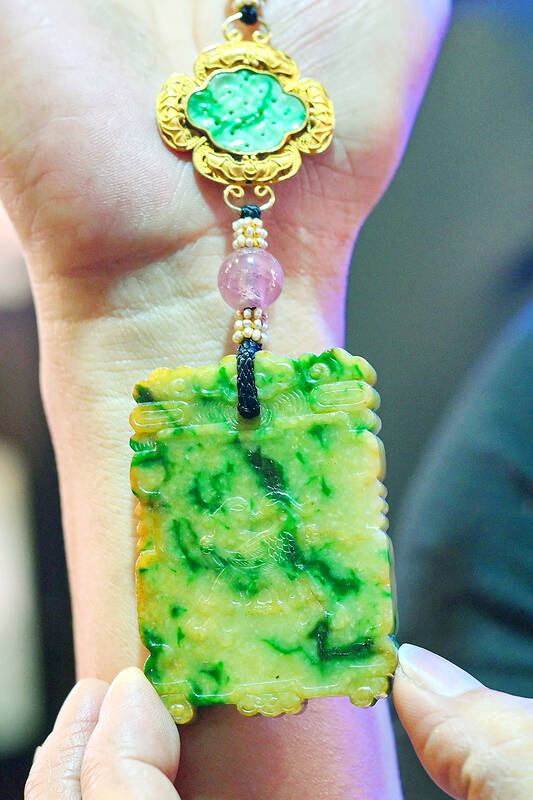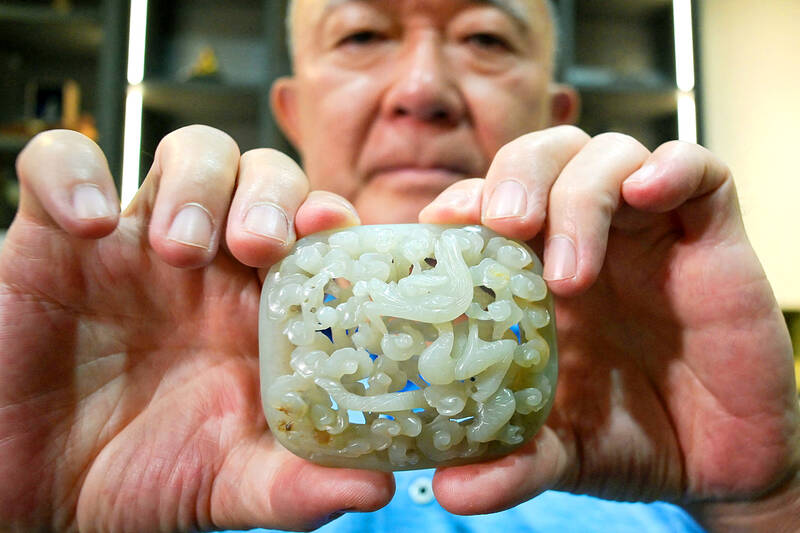Tracing a palm-sized jade pig resting on its haunches, an antique trader in Taiwan said the ears on the nearly 400-year-old piece are a marker of its authenticity.
“The folds in the pig’s ears show the handiwork, the ancient handicraft” of the Ming Dynasty (1368-1644), said the 60-year-old trader, who would only provide his last name as Lee. “It takes very careful carving. If it were duplicates, they wouldn’t make it that delicate and detailed.”
Lee’s shop in Taipei’s Daan district holds ancient treasures worth more than a condominium located in the same neighborhood. The value of his merchandise represents just a fraction of an industry that the island’s jade association says brought in nearly US$16 million annually in recorded pre-pandemic antique jade sales.

Photo: AFP
But dealers warn the sector is flagging post-COVID. With the global economy in tatters, buyers are more cautious about taking a chance on expensive items, especially with the market awash with counterfeits. Taipei’s worsening ties with Beijing have also meant restrictions are still in place for visitors from China, effectively cutting out the industry’s biggest buyers. Relations have plummeted since Taiwanese twice elected President Tsai Ing-wen (蔡英文), who refuses to accept Beijing’s claim that the self-ruled island belongs to China, was elected in 2016.
“About seven to 12 years ago, it was very good times for people in Taiwan who are in the antiques or jade trade,” said Liu San-bian, who runs a store in Metropolitan Jewelry and Antiques Emporium. “It declined when cross-strait politics slowly affected travel between both sides,” he said, summing up the dilemma in four Chinese characters meaning: “Hard to buy, hard to sell.”
“Chinese people stopped coming in and rich people in Taiwan are not buying. There is no supply in the market... and collectors here are not willing to release their items for sale.”

Photo: AFP
‘INGRAINED IN OUR DNA’
Taiwan was the go-to place for hunters of Chinese relics long before it became a powerhouse for hi-tech semiconductors. Collectors said most were carried out of China during the Cultural Revolution, ending up on the island and nearby Hong Kong.
The Chinese government generally considers the trade of antiques from historical eras to be illegal if they were not passed down through inheritance or bought from authorized venues, such as cultural relic stores.

Photo: AFP
But there is a grey area in Taiwan, where collectors say they have obtained the items through legitimate means, especially if the items were personal belongings.
“To the Chinese, it is ingrained in our DNA,” said Chang Ju-ben, chairman of Taiwan’s Association of Jade Collectors.
“Collectors in Taiwan began collecting when they realized that these were valuable national treasures... Taiwan has a reputation in the Greater Chinese community, that you can come here to see, touch and buy good jades here.”
The antique jade market took off around 2011, when Beijing-friendly Ma Ying-jeou (馬英九) was president, bringing in “an endless stream of buyers from China and other countries,” Chang said. Now Taiwan’s market is about a quarter of its former annual value — roughly US$9.4 million to US$15.7 million in the boom years — and it is easy to be steered towards inauthentic “artefacts.”
“It relies on word of mouth,” Chang said. “You have to walk the right path and find the right person.”
Most reputable collectors are also “protective” about their stock, refusing to show their best items to a novice who won’t appreciate it or to a buyer simply looking to resell for profit.
‘BUILD A REPUTATION’
A two-hour flight to Hong Kong — a hub for Chinese antiques sold in both sprawling markets and upscale auction houses — tells a different story.
Pola Antebi, deputy chairman at Christie’s auction house in Hong Kong, said she is seeing a trend in which antique collectors are releasing long-cherished collections held for up to five decades.
“We’ve sold several substantial collections from Taiwan in Hong Kong in recent years, including the notable Chang Wei-hwa collection of early jades,” Antebi said.
That portfolio of jades from the Qin and Han dynasties fetched US$9.3 million in November, while three previous auctions of Chang Wei-hwa’s collection brought in US$24.7 million from 2019 to 2021. Taiwan’s jade “players” remain confident the trade “will survive no matter what,” said the trader Lee.
His unique shop, which houses aquariums of iridescent corals, gets visitors via word of mouth. One trip can turn into several before any transaction is made — if at all.
“It takes very long to build a reputation, but it is very easy to ruin it. If one item you sell turns out to be fake... that’s all it takes to ruin you,” he said.

Jacques Poissant’s suffering stopped the day he asked his daughter if it would be “cowardly to ask to be helped to die.” The retired Canadian insurance adviser was 93, and “was wasting away” after a long battle with prostate cancer. “He no longer had any zest for life,” Josee Poissant said. Last year her mother made the same choice at 96 when she realized she would not be getting out of hospital. She died surrounded by her children and their partners listening to the music she loved. “She was at peace. She sang until she went to sleep.” Josee Poissant remembers it as a beautiful

March 2 to March 8 Gunfire rang out along the shore of the frontline island of Lieyu (烈嶼) on a foggy afternoon on March 7, 1987. By the time it was over, about 20 unarmed Vietnamese refugees — men, women, elderly and children — were dead. They were hastily buried, followed by decades of silence. Months later, opposition politicians and journalists tried to uncover what had happened, but conflicting accounts only deepened the confusion. One version suggested that government troops had mistakenly killed their own operatives attempting to return home from Vietnam. The military maintained that the

Before the last section of the round-the-island railway was electrified, one old blue train still chugged back and forth between Pingtung County’s Fangliao (枋寮) and Taitung (台東) stations once a day. It was so slow, was so hot (it had no air conditioning) and covered such a short distance, that the low fare still failed to attract many riders. This relic of the past was finally retired when the South Link Line was fully electrified on Dec. 23, 2020. A wave of nostalgia surrounded the termination of the Ordinary Train service, as these train carriages had been in use for decades

Lori Sepich smoked for years and sometimes skipped taking her blood pressure medicine. But she never thought she’d have a heart attack. The possibility “just wasn’t registering with me,” said the 64-year-old from Memphis, Tennessee, who suffered two of them 13 years apart. She’s far from alone. More than 60 million women in the US live with cardiovascular disease, which includes heart disease as well as stroke, heart failure and atrial fibrillation. And despite the myth that heart attacks mostly strike men, women are vulnerable too. Overall in the US, 1 in 5 women dies of cardiovascular disease each year, 37,000 of them